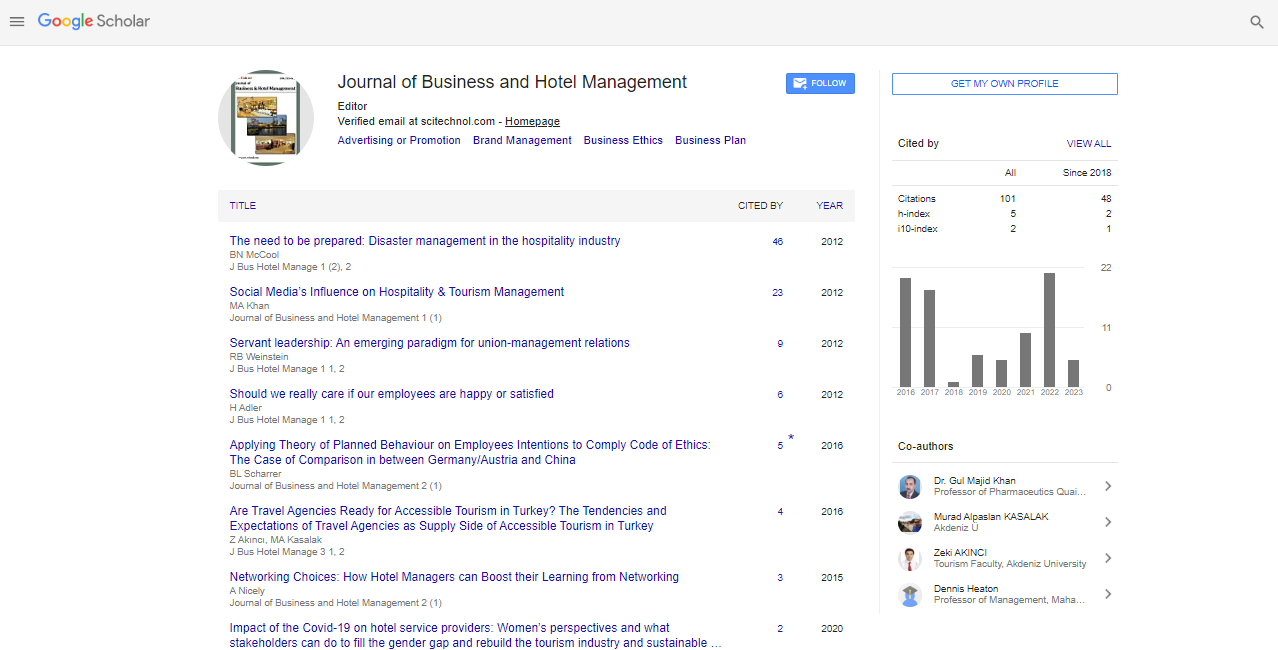Opinion Article, J Bhm Vol: 9 Issue: 1
Brand Excellence through Improved Brand Management
Heather Polli*
1Department of Management, University of Bristol, Bristol, United Kingdom
*Corresponding Author: Heather Polli
Department of Management, University of
Bristol, Bristol, United Kingdom
E-mail: heat.polli@bristol.ac.uk
Received date: 03 February, 2023, Manuscript No. JBHM-23-96114;
Editor assigned date: 07 February, 2023, PreQC No. JBHM-23-96114 (PQ);
Reviewed date: 21 February, 2023, QC No. JBHM-23-96114;
Revised date: 28 February, 2023, Manuscript No. JBHM-23-96114 (R);
Published date: 07 March, 2023, DOI: 10.4172/2324-9129.9.1.133
Citation: Polli H (2023) Brand Excellence through Improved Brand Management. J BHM 9:1.
Description
In today's competitive business landscape, building and managing a strong brand is important for success. A well-managed brand not only sets a company apart from its competitors but also establishes trust, loyalty and credibility among customers. Brand excellence can be achieved through effective brand management strategies that encompass various aspects of brand development, maintenance and enhancement.
Importance of brand management
Brand management involves creating and maintaining a positive brand perception through various activities, including positioning, identity, communication and consistency, impacting customer perception, purchase decisions and loyalty.
Brand Positioning: Brand positioning involves communicating a brand's unique value proposition, differentiating it from competitors, through elements such as brand promise, attributes and target audience, to establish a strong market position.
Brand identity: Brand identity encompasses a brand's visual representation, including logo, colors, typography, and design elements, which convey its personality, values and essence and is essential for brand recognition and memorability.
Brand communication: Effective brand communication involves clear, consistent messaging across all channels, aligned with brand positioning, producing consistent brand experience and build awareness awareness, recall and loyalty among customers.
Brand consistency: Brand consistency is essential for establishing a strong brand image and trust, ensuring coherence across all aspects of the brand, including positioning, identity, communication and customer experience, through clear guidelines and consistent enforcement.
Employee brand advocacy
Employees are vital brand ambassadors who play a vital role in brand management by aligning with the brand's vision and values, promoting brand consistency and impacting customer perception and loyalty through their interactions and advocacy efforts.
Brand monitoring and measurement
Monitoring and measuring brand performance through data-driven analysis of brand-related metrics, such as awareness, sentiment, equity and feedback, is important for effective brand management and continuous brand improvement.
Brand enhancement strategies
Brands should proactively pursue opportunities for brand enhancement, including rebranding, brand extensions, innovation, customer experience improvements, and partnerships, while aligning with brand vision and values, to maintain brand consistency and resonate with the target audience.
Brand crisis management
Effective brand crisis management is important in safeguarding a brand's reputation during potential crises through robust crisis management plans that outline protocols, responsibilities and communication strategies to minimize damage and protect the brand's image.
Brand innovation and evolution
Brands should proactively innovate and adapt to changing customer preferences, market trends and technological advancements to stay relevant and meet the evolving needs of their target audience in the dynamic business environment.
Measuring brand Return on Investment (ROI)
Measuring ROI of brand management efforts through established metrics and Key Performance Indicator’s (KPIs) are important to optimize brand strategies, justify investments, and drive business outcomes such as increased brand awareness, customer acquisition, retention and revenue growth.
Building brand equity
Building brand equity through consistent efforts to deliver exceptional customer experiences, maintain brand consistency, and uphold the brand promise is important for enhancing intangible brand value, customer perception, loyalty, recognition and gaining a competitive advantage.
Conclusion
Implementing effective brand management strategies, such as brand positioning, brand identity, brand communication, consistency, employee advocacy, monitoring, enhancement, crisis management, innovation and measuring ROI, are important for achieving brand excellence, customer loyalty and equity and the business success.
 Spanish
Spanish  Chinese
Chinese  Russian
Russian  German
German  French
French  Japanese
Japanese  Portuguese
Portuguese  Hindi
Hindi 